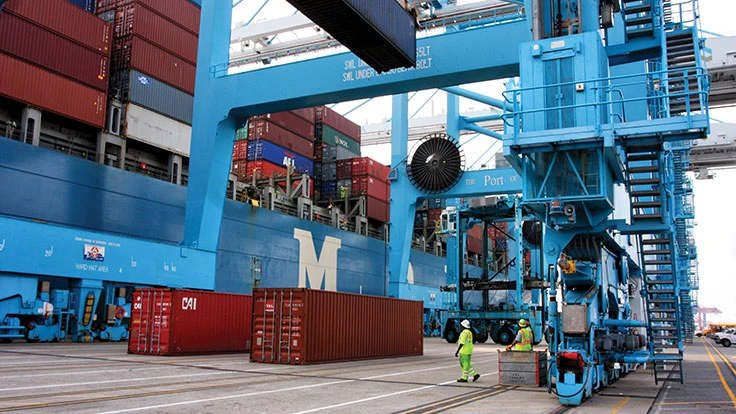
Photo courtesy of the Port of Virginia
Members of the International Longshoremen's Association (ILA) were called back to work late Thursday following a tentative agreement on wages with the United States Maritime Alliance Ltd. (USMX), representing ocean carriers and port operators. The parties have agreed to extend the master contract until Jan. 15, 2025, and to return to the bargaining table to negotiate outstanding issues, including the use of automation at the ports. With the agreement, operations have resumed at the ports affected on the East and Gulf coasts.
The American Association of Port Authorities (AAPA) celebrated the agreement, with AAPA President and CEO Cary S. Davis saying, “Without the strong cooperation of management and labor, port authorities simply cannot move cargo, maintain a fluid supply chain and keep our nation’s economy growing. As it takes some time for operations to return to normal, we must be patient and are also reminded once again that our system is resilient and can withstand short and contained impediments. However, we are glad the strike has ended, and AAPA sincerely thanks the USMX and ILA for coming together and negotiating an agreement.”
The AAPA notes that ports have a limited role in labor negotiations and most do not directly employ labor. However, AAPA sent President Biden a letter dated Sept. 24, before the strike began, highlighting the potentially devastating impacts of a protracted strike on our nation’s supply chain and economy.
Earlier in the week, Acting Secretary of Labor Julie Su commented on the negotiations between USMX and the ILA: “Over the last week and more, I have spent hours on the phone and in meetings with the parties urging them to find a way to reach a fair contract. This country’s port workers put their health and safety on the line to keep working through the pandemic so we could get the goods we needed as COVID raged, and these workers will help communities recover from the devastating effects of Hurricane Helene. As these companies make billions and their CEOs bring in millions of dollars in compensation per year, they have refused to put an offer on the table that reflects workers’ sacrifice and contributions to their employer’s profits.
“The American economy has defied all expectations thanks to the Biden-Harris administration’s leadership. There is room for both companies and their workers to prosper. The parties need to get back to the negotiating table, and that must begin with these giant shipping magnates acknowledging that if they can make record profits, their workers should share in that economic success.”
As part of the tentative agreement, news reports indicate that ILA members will receive a 62 percent wage increase over six years, citing sources who were familiar with the deal but not authorized to speak publicly about it. The union was seeking a 77 percent increase over six years. A day before the strike began, USMX had offered nearly 50 percent in raises.
At the start of the strike, Biden issued a statement that read in part, “Collective bargaining is the best way for workers to get the pay and benefits they deserve. I have urged USMX, which represents a group of foreign-owned carriers, to come to the table and present a fair offer to the workers of the International Longshoremen’s Association that ensures they are paid appropriately in line with their invaluable contributions. Ocean carriers have made record profits since the pandemic, and in some cases, profits grew in excess of 800 percent compared to their profits prior to the pandemic. Executive compensation has grown in line with those profits, and profits have been returned to shareholders at record rates. It’s only fair that workers, who put themselves at risk during the pandemic to keep ports open, see a meaningful increase in their wages as well.”
In a statement released after the tentative agreement was reached, Vice President Harris says, “This step indicates progress toward a strong contract and represents the power of collective bargaining. As I have said, this is about fairness—and our economy works best when workers share in record profits. Dockworkers deserve a fair share for their hard work getting essential goods out to communities across America.”
In an alert to its members of the temporary agreement, the Recycled Materials Association (ReMA), Washington, notes that it is working to focus on potential risks that remain and must be addressed between now and mid-January, should the ILA and USMX fail to reach an agreement, which could result in another strike.
Latest from Recycling Today
- Lautenbach Recycling names business development manager
- Sebright Products partners with German waste management equipment company
- WasteExpo transitions to biennial format for enhanced experiences
- Study highlights progress, challenges in meeting PCR goals for packaging
- Washington legislature passes EPR bill
- PureCycle makes progress on use of PureFive resin in film trials
- New copper alloy achieves unprecedented high-temperature performance
- Gränges boosts profits and sales volume in Q1 2025





